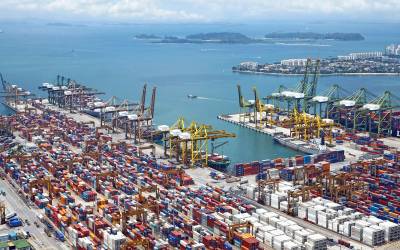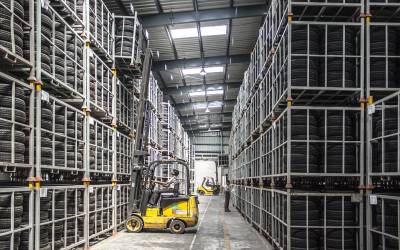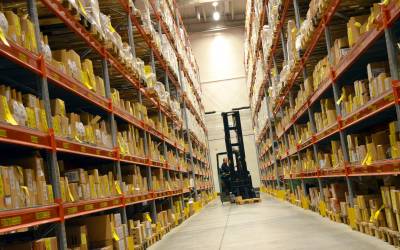Studying for an MSc in Supply Chain Management

Keeping up with rapid technological advances in essential for a good course
The successful management of supply chains has always been critical to global trade: the advent of steam powered ships and railways is widely credited with bringing about the Industrial Revolution in the late 1700s and early 1800s.
Today supply chains are extremely complex, global and rapidly changing. Ships may still play an integral role in global trade, but the rise of ecommerce, and consumers wanting faster delivery of goods, has changed how supply chain managers work, or is creating new jobs entirely.
An MSc in Supply Chain Management can help you get ahead of the curve of change. “Supply chain management is at the core of all global trade, so there will always be plenty of opportunities for high-quality supply chain professionals,” says Dr Niels Agatz, academic director of the MSc program in Supply Chain Management at the Rotterdam School of Management (RSM).
Because we’re shopping so differently, managers need to be able to, for example, take advantage of automation, omni (multi)-channel retailing and “predictive shipping”, whereby savvy retailers, such as Amazon, are trying to ship products to customers before they’ve even ordered them.
“In online retail, the quality of the delivery service (lead-time, time window choices) is as important as the quality of the ordered goods,” Agatz says.
[See all master's programs in Supply Chain Management]
RSM’s MSc in Supply Chain Management, which is 12 months long, has responded to the way technology is changing the work of supply chains and their managers: after taking core courses in global logistics, operations research et al, students can take a myriad of elective modules, for instance on forecasting demand for products with technology.
RSM draws on its natural strengths: being located next to the biggest port in Europe means the school can bring “real-world” supply chain problems into the classroom for group discussion, as well as executive guest speakers.
“As our lecturers also do academic research and collaborate with companies in each of these supply chain domains, they are up to date about the latest trends, hypes and technologies,” says Agatz.
At Rutgers Business School in New Jersey, a one-week executive seminar focuses on the latest supply chain trends, in the MSc in Supply Chain Management program. “We are constantly challenging ourselves as a program, as well as our faculty, to keep our courses as fresh and up-to-date as possible,” says Rudolf Leuschner, who is director of the MSc.
Students can, for example, opt to take optional courses on using enterprise software created by SAP, the German software company, with Rutgers’ MBA candidates.
The MSc course is taught entirely online and can be completed in a year, though students can opt to come to campus for some courses. They study digitally via pre-recorded video lectures and group discussion chatrooms, and in doing so they learn to collaborate remotely and globally using technology, which is not unlike the work of a supply chain manager.
MSc programs in supply chain: beyond the rankings and reputation
With a wealth of master’s-level courses in supply chain management to choose from—not to mention the varied MScs in other, related fields such as logistics and operations management—prospective students should consider the method of course delivery, as well as the curriculum, faculty credentials and students when picking a program, says Leuschner. “While reputation and rankings are important, prospective students should go beyond just the numbers and actually look at the program more deeply,” he says.
To get into Rutgers’ course, applicants need an undergraduate GPA of 3.0 or higher, ideally a business or engineering major from an accredited college, strong letters of recommendation, some relevant work experience, and well-written essays.
“We are looking for applicants who are going to be able to contribute to our community of scholars, as well as become future ambassadors for the program,” Leuschner says, adding that the school admits 70-80 new students to the program each year.
Steve DeNunzio, director of the Master of Business Logistics Engineering — a course taught jointly by Ohio State University’s Fisher College of Business and the College of Engineering — says that the prospective students should also search out courses that interact with companies through projects, networking, and mentorship; employment outcomes; and STEM designation.
Fisher’s course has the latter, which enables non-US students on F-1 visas, which entitles them to 12 months’ work experience in the US on graduation, to extend that stay to 24 months.
The Master of Business Logistics Engineering program includes experiential projects with companies such as Honda, FedEx and DHL and boasts a 100 percent employment rate for 2017’s graduating class. The average salary was $64,937. DeNunzio says alumni work at 153 different companies and in 18 different countries, including manufacturing firms like Apple and Tesla, plus consultancy firms including EY and Deloitte.
“We look for candidates that were not only excellent undergraduate students overall, but who have displayed a strong understanding of quantitative disciplines,” says DeNunzio. “High-performing supply chain leaders understand both how to lead people, but also how to manage data and technology.”









